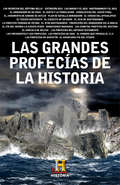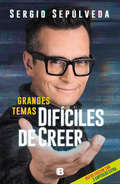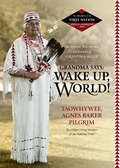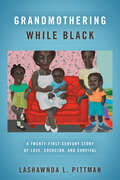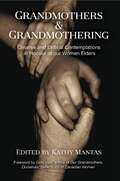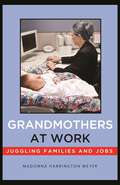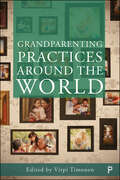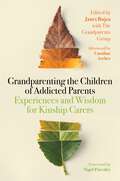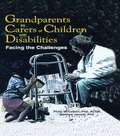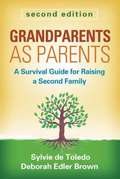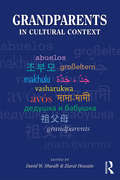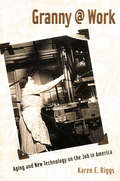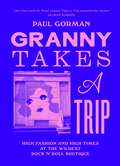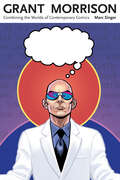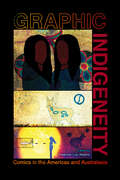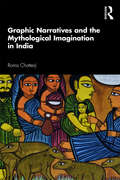- Table View
- List View
Grandes profecías de la historia
by Canal de Canal de HistoriaSegún los mayas y otras culturas milenarias, el fin del mundo está muy cerca... Canal de Historia desvela, de forma amena y rigurosa, las profecías más famosas de la historia.Profecías religiosas, bíblicas, profanas, de iluminados anónimos o de ilustres personajes, Las grandes profecías de la Historia recoge en veinticinco capítulos, los principales y más famosos vaticinios de la historia de la humanidad. De los griegos a los egipcios, pasando por los cristianos y los mayas, todas las grandes civilizaciones se han preocupado por controlar su destino prediciendo el futuro y, en muchas ocasiones, han acertado. Canal de Historia acompaña al lector en un revelador recorrido por uno de los más oscuros e inexplorados caminos de la historia, para desvelar quién predijo los atentados del 11-S, cómo marcaban el destino de los mortales las pitonisas de Delfos o en qué momento llegará el Juicio Final para los cristianos.Leonardo Da Vinci, Nostradamus, Newton, Rasputín o Edgar Cayce, son algunos de los nombres propios que, junto con expertos anónimos de diferentes culturas y credos, han realizado sus propias predicciones a lo largo de los siglos. ¿Cuánto hay de invención y cuánto de realidad en cada una de ellas?, ¿cuáles tienen base científica?, ¿en qué casos se han cumplido? Con su habitual mezcla de entretenimiento y rigor, Canal de Historia responde a estas y otras preguntas en un libro que apasionará por igual a aficionados e inexpertos de la parte más esotérica de la historia.
Grandes temas difíciles de creer
by Sergio Sepulveda¿Qué tanto sabe la humanidad acerca de sí misma? ¿Hasta dónde la superstición, el miedo, la magia y lo incognoscible construyen la Historia? Sergio Sepúlveda nos presenta una serie de apasionantes investigaciones en las que lo increíble ha plasmado su huella. Por estas páginas desfilan casos tan insólitos como el éxodo de los israelitas a través del mar Rojo, la maldición del número 27 en el rock, enigmáticos fantasmas, la historia secreta de la Ouija, entre otros. Sin lugar a dudas, grandes misterios que han dejado asombrada a la memoria colectiva y para los cuales difícilmente hay sólo una explicación. Grandes temas difíciles de creer ofrece más preguntas que respuestas a la mente del lector, y lo más importante es que demuestra que la realidad entera está sembrada de oscuras incógnitas. Atreverse a leerlo es entrar en el terreno de lo extraño, de lo dudoso y de lo que es difícil de creer. ¡BIENVENIDO A UN UNIVERSO EXTRAORDINARIO!
Grandes temas difíciles de creer: El universo es un lugar sorprendente
by Sergio Sepulveda¿Qué tanto sabe la humanidad acerca de sí misma? ¿Hasta dónde el miedo, la superstición y la magia construyen la Historia? A continuación, descubrirás la verdad sobre grandes temas difíciles de creer. Fantasmas, astronautas, grandes amores, leyendas, crímenes, historias bíblicas, reliquias de la antigüedad y muchos de los grandes misterios que han dejado asombrada a la memoria colectiva, son el alimento de la magia. También, son la materia prima que construyen estas páginas. Grandes temas difíciles de creer es un libro que responderá muchas preguntas, pero al mismo tiempo te hará pensar que el universo está sembrado de duda.
Grandma Says: The Wisdom, Wit, Advice, and Stories of “Grandma Aggie”
by Agnes Baker PilgrimAgnes Baker Pilgrim, known to most as Grandma Aggie, is in her nineties and is the oldest living member of the Takelma Tribe, one of the Confederated Tribes of Siletz.A descendant of both spiritual and political tribal leaders, Grandma Aggie travels tirelessly around the world to keep traditions alive, to help those in need, and to be a voice for the voiceless, helping everyone to remember to preserve our Earth for animals and each other in a spiritual environment.Considered an excellent speaker, she has mesmerized her audience wherever she appears, and now her wit, wisdom, memories, advice, stories and spirituality have been captured for all to hear.Honored as a “Living Cultural Legend” by the Oregon Council of the Arts, Grandma Aggie here speaks about her childhood memories, about her tribe and her life as a child growing up in an area that often didn’t allow Indians and dogs into many public places, as well as about such contemporary issues as bullying, teen suicide, drugs and alcohol, Pope Francis, President Obama, water conservation, climate change, and much more. This is an amazing recording of one of the oldest and most important voices of the First Nation and of the world. Her stories and advice will mesmerize and captivate you, as well as provide a blueprint for how all the inhabitants of the earth can live together in harmony, spirituality, and peace.
Grandma's Remedies: A Guide to Traditional Cures and Treatments from Mustard Poultices to Rosehip Syrup
by Cherry ChappellLong before modern medicines became so widely available, families treated everyday illnesses with home-made remedies. Reused and refined year after year, they were handed down through the generations then lovingly copied into personal 'receipt' books. Grandma's Remedies brings together a beguiling collection of them, gathered from dusty medicine chests found in attics, recalled from childhoods long past, or discovered in family archives and libraries. Many of them are surprisingly effective. Did you know, for example, that drinking two cups of strong black coffee will alleviate an asthma attack? Or that chewing toasted fennel seeds will help combat indigestion? Or that rosehip syrup is a terrific source of vitamin C? But Grandma's Remedies is more than a guide to these traditional treatments, it also paints a vivid portrait of the world of our grandparents and great-grandparents. It shows how inventive and resourceful they were with the materials near to hand, how they made the most of everything in the store-cupboard, from bread through to vinegar, and how it was the women of the household who, despite being barred from the medical profession, were relied on to safeguard family health. In these days of antibiotics and painkillers, it's easy to forget how people survived when all they had to rely on was a garden, a larder and a healthy dose of common sense.
Grandmothering While Black: A Twenty-First-Century Story of Love, Coercion, and Survival
by LaShawnDa L. PittmanIn Grandmothering While Black, sociologist LaShawnDa L. Pittman explores the complex lives of Black grandmothers raising their grandchildren in skipped-generation households (consisting only of grandparents and grandchildren). She prioritizes the voices of Black grandmothers through in-depth interviews and ethnographic research at various sites—doctor's visits, welfare offices, school and day care center appointments, caseworker meetings, and more. Through careful examination, she explores the various forces that compel, constrain, and support Black grandmothers' caregiving. Pittman showcases a fundamental change in the relationship between grandmother and grandchild as grandmothers confront the paradox of fulfilling the social and legal functions of motherhood without the legal rights of the role. Grandmothering While Black illuminates the strategies used by grandmothers to manage their legal marginalization vis-à-vis parents and the state across a range of caregiving arrangements. In doing so, it reveals the overwhelming and painful decisions Black grandmothers must make to ensure the safety and well-being of the next generation.
Grandmothers and Grandmothering: Creative and Critical Contemplations in Honour of our Women Elders
by Kathy MantasToday, more and more grandmothers around the world are taking on varied responsibilities and many roles, sometimes concurrently. Consequently, grandmothers continue to play, as in the past, an influential role not only in the lives of their grandchildren, but also in our communities and in society more broadly. Grandmothers and Grandmothering: Creative and Critical Contemplations in Honour of our Women Elders, as the title suggests, seeks to pay homage to our grandmothers and their contributions to society. As well, it aims to explore the textured and complex phenomena of grandmothering from a range of disciplines and cultural perspectives. Our hope is that this collection challenges preconceived notions of what it means to be a grandmother and provides insight into the multifaceted nature of grandmothering.
Grandmothers at Work: Juggling Families and Jobs
by Madonna Harrington MeyerA study of the lived experience of working grandmothers in early twenty-first–century America.Young working mothers are not the only ones who are struggling to balance family life and careers. Many middle-aged American women face this dilemma as they provide routine childcare for their grandchildren while pursuing careers and trying to make ends meet. Madonna Harrington Meyer’s Grandmothers at Work explores the lived experience of working grandmothers. While all of the grandmothers in the book are pleased to spend time with their grandchildren, many are readjusting work schedules, using vacation and sick leave time, gutting retirement accounts, and postponing retirement to care for grandchildren. Some simply want to do this; others do so because their adult children need assistance and may have less security and flexibility on the job than do their mothers. Most of the grandmothers expect to continue feeling the pinch of paid and unpaid work for many years before their retirement. Grandmothers at Work provides a unique perspective on a phenomenon faced by millions of women in America today.Winner of the 2014 Richard Kalish Innovative Publication Award presented by the Gerontological Society of America
Grandmothers of the Light: A Medicine Woman's Sourcebook
by Paula Gunn AllenAllen retells and interprets 21 stories from civilizations spanning North America, including Chippewa, Okonagon, Iroquois, and Lakota--stories that have, for centuries, guided female shamans toward an understanding of the sacred.
Grandparenting Practices Around the World: Reshaping family
by Virpi TimonenThis exciting collection presents an in-depth, up-to-date analysis of the unprecedented phenomenon of increasing numbers of grandparents worldwide, co-existing and interacting for longer periods of time with their grandchildren. The book contains analyses of topics that have so far received relatively little attention, such as transnational grandparenting and gender differences in grandparenting practices. It is the only collection that brings together theory-driven research on grandparenting from a wide variety of cultural and welfare state contexts - including chapters on Europe, North America, Africa, Asia and Australia - drawing broad lines of debate rather than focusing at a country level. Building on the success of ‘Contemporary grandparenting’, edited by Virpi Timonen and Sarah Arber, this book further deepens our understanding of how social structures continue to shape grandparenting across a wide range of cultural and economic contexts. The book is essential reading and reference for researchers, students and policy-makers who want to understand the growing influence of grandparents in ageing families and societies across the world.
Grandparenting the Children of Addicted Parents: Experiences and Wisdom for Kinship Carers
by Caroline Archer Janet Bujra Nigel Priestleyxx
Grandparents as Carers of Children with Disabilities: Facing the Challenges
by Matthew Janicki Phillip MccallionOlder adults caring for developmentally disabled children have special needs. Are you and your agency doing all you can to help?Grandparents as Carers of Children with Disabilities: Facing the Challenges provides the first comprehensive picture of grandparents caring for children with developmental disabilities and their related requirements. Here you'll find information on the mental and physical health of these caregivers, highlighting their unique needs and the roles that agencies and advocates need to play in order to meet them. This unique volume will assist practitioners, administrators, and policymakers in including the needs of this group into planning and service delivery efforts.Grandparents as Carers of Children with Disabilities: Facing the Challenges takes an incisive look at: characteristics of these carers and the children they care for children in kinship care and their special needs the effect of kinship foster care on caregiving grandmothers the approach of Latino grandparents to bringing up children with special needs the service needs and provision issues of grandparent carers In this book, here is some of what you'll find: data from a school-based comprehensive multigenerational program in East Harlem, New York City, which explores environmental stressors associated with children coming into kinship care, discussing the impact on grandparent caregivers, with a focus on health status and access to care correlates of self-reported depressive symptoms among urban Latino grandparent caregivers a survey of grandparents (mostly African American, mostly female) caring for children with developmental disabilities in New York City that focuses on health status, emotional state, use of formal and informal services, and general life situation helpful charts and tables that put the facts at your fingertips a demonstration project that used an intervention model to determine how a three-pronged approach using outreach, support groups, and case management could be used to aid grandparents caring for children with developmental delay or disabilities ... and much more!As editors McCallion and Janicki point out, ”Primary childcare is rapidly becoming a normative experience of grandparenting. Grandparent primary care is found among all ethnic groups, and across all socioeconomic levels of society. Concern over preserving the family often causes grandparents to assume responsibility in spite of their limited financial means or own health conditions.” Grandparents as Carers of Children with Disabilities will enable you to provide these courageous, loving people with the help they need to do this extraordinarily difficult and often thankless job.
Grandparents as Parents, Second Edition
by Sylvie De Toledo Deborah Edler BrownIf you're among the millions of grandparents raising grandchildren today, you need information, support, and practical guidance you can count on to keep your family strong. This is the book for you. Learn effective strategies to help you cope with the stresses of parenting the second time around, care for vulnerable grandkids and set boundaries with their often-troubled parents, and navigate the maze of government aid, court proceedings, and special education. Wise, honest, moving stories show how numerous other grandparents are surviving and thriving in their new roles. Updated throughout, and reflecting current laws and policies affecting families, the second edition features new discussions of kids' technology use and other timely issues.
Grandparents in Cultural Context
by David W. Shwalb Ziarat HossainGrandparents in Cultural Context gives a long overdue global view of the changing roles of grandparents. The eleven main chapters are by experts in the Americas, Europe and Russia, Asia, and Africa and the Middle East, and the editors integrate their chapters with previous writings on grandparenthood. Rather than technical or statistical research reports, each chapter provides a thought-provoking and comprehensive review of research, real-life case stories, cultural influences, and applied implications for grandparenthood across and within societies. Calling special attention to the roles of grandfathers and grandparenthood in societies previously un-represented in the literature, it provides several hundred new citations of work previously unavailable in English-language publications. Accessible to both scholars and students, it has several pedagogical features (e.g. web links, discussion questions) that make it useful as a text for upper-division undergraduate or graduate level classes in behavioral, social, and family sciences. It is relevant to psychology, gerontology, family studies, anthropology, family/comparative sociology, education, social work, gender studies, ethnic studies, psychiatry, and diversity and international studies programs. Practitioners, service providers, policymakers, and internationally minded grandparents will also enjoy this book.
Granny @ Work: Aging and New Technology on the Job in America
by Karen E. RiggsGranny @ Work is an impassioned comment on aging, work, and technology in American culture. As Riggs challenges popular assumptions with surprising research-for example, people over the age of 60 spend more time on the Internet than people of any other age group-and trenchant cultural critique, she forces us to confront the deeply entrenched ageism in today's technology-driven workplace.
Granny D
by Doris Haddock Dennis BurkeIn February 2000, ninety-year-old Doris “Granny D” Haddock became a national heroine when she completed her 3,200-mile, fourteen-month walk from Los Angeles to Washington, D. C. , to bring attention to the issue of campaign finance reform. Granny Drecalls and celebrates an exuberant life of love, ac-tivism, and adventure—from one-woman feminist plays in the thirties, to stopping nuclear testing near an Eskimo fishing village in 1963, to her current crusade. Threaded throughout is the spirit of her beloved hometown in New Hampshire—Thornton Wilder’s inspiration for Grover’s Corners in Our Town—a quintessentially American center of New England pluck, Yankee ingenuity, and can-do attitude. Told in Doris’s vivid and unforgettable voice,Granny Dwill move and delight readers with its clarion message that one person can indeed make a difference.
Granny Takes a Trip: High Fashion and High Times at the Wildest Rock 'n' Roll Boutique
by Paul GormanLavishly illustrated with never-before-seen photographs of the shop, its key players and - of course - the clothes.Granny Takes A Trip was more than just a shop and a fashion brand; it was the original rock and roll clothes boutique, the template for all that followed. What started as an odd retail venture/art installation in a depressed part of London known as World's End became an international byword for glam decadence in Manhattan and Hollywood, combining flamboyant style and all manner of countercultural activity to attract everyone from Pattie Boyd, Marianne Faithfull and Anita Pallenberg to Elton John, Jimi Hendrix, Miles Davis, Mick Jagger, Rod Stewart, the Beatles, and Lou Reed.Unfolding over a decade-and-a-half, this tumultuous story invokes a cast of often unique, sometimes entitled, unusually talented and troubled individuals on a collective mission to shake up austere, repressed, class-ridden Britain and white bread America. Some achieved this at great personal cost as darkness, addiction and tragedy stalked those behind the extraordinary shop facades.Much mythologised but never told, this cautionary tale has now found its definitive chronicler in celebrated cultural historian Paul Gorman who has had access to first-hand accounts from all the principal figures, as well as notes for a memoir and a much-treasured scrapbook by Freddie Hornik, the tailoring entrepreneur who survived the death marches of central Europe after WW2 to acquire Granny Takes A Trip in the late 60s and transform into an unparalleled pop cultural force.
Granny Takes a Trip: High Fashion and High Times at the Wildest Rock 'n' Roll Boutique
by Paul GormanGranny Takes A Trip was more than just a shop and a fashion brand; it was the original rock and roll clothes boutique, the template for all that followed. What started as an odd retail venture/art installation in a depressed part of London known as World's End became an international byword for glam decadence in Manhattan and Hollywood, combining flamboyant style and all manner of countercultural activity to attract everyone from Pattie Boyd, Marianne Faithfull and Anita Pallenberg to Elton John, Jimi Hendrix, Miles Davis, Mick Jagger, Rod Stewart, the Beatles, and Lou Reed.Unfolding over a decade-and-a-half, this tumultuous story invokes a cast of often unique, sometimes entitled, unusually talented and troubled individuals on a collective mission to shake up austere, repressed, class-ridden Britain and white bread America. Some achieved this at great personal cost as darkness, addiction and tragedy stalked those behind the extraordinary shop facades.Much mythologised but never told, this cautionary tale has now found its definitive chronicler in celebrated cultural historian Paul Gorman who has had access to first-hand accounts from all the principal figures, as well as notes for a memoir and a much-treasured scrapbook by Freddie Hornik, the tailoring entrepreneur who survived the death marches of central Europe after WW2 to acquire Granny Takes A Trip in the late 60s and transform into an unparalleled pop cultural force.Listeners can find a selection of key photos and images from the history of Granny Takes a Trip in the accompanying PDF.
Granny Takes a Trip: High Fashion and High Times at the Wildest Rock 'n' Roll Boutique
by Paul GormanLavishly illustrated with never-before-seen photographs of the shop, its key players and - of course - the clothes.Granny Takes A Trip was more than just a shop and a fashion brand; it was the original rock and roll clothes boutique, the template for all that followed. What started as an odd retail venture/art installation in a depressed part of London known as World's End became an international byword for glam decadence in Manhattan and Hollywood, combining flamboyant style and all manner of countercultural activity to attract everyone from Pattie Boyd, Marianne Faithfull and Anita Pallenberg to Elton John, Jimi Hendrix, Miles Davis, Mick Jagger, Rod Stewart, the Beatles, and Lou Reed.Unfolding over a decade-and-a-half, this tumultuous story invokes a cast of often unique, sometimes entitled, unusually talented and troubled individuals on a collective mission to shake up austere, repressed, class-ridden Britain and white bread America. Some achieved this at great personal cost as darkness, addiction and tragedy stalked those behind the extraordinary shop facades.Much mythologised but never told, this cautionary tale has now found its definitive chronicler in celebrated cultural historian Paul Gorman who has had access to first-hand accounts from all the principal figures, as well as notes for a memoir and a much-treasured scrapbook by Freddie Hornik, the tailoring entrepreneur who survived the death marches of central Europe after WW2 to acquire Granny Takes A Trip in the late 60s and transform into an unparalleled pop cultural force.
Granny Thornapple's Book of Charms: Magic & Folklore from the Ozark Mountains
by Brandon WestonSpeak in the Charming Tradition of Ozark Rhymes, Poems & VersesLittle Ann was born in Nelson's Holler during a thunderstorm on the same day her grandmother died. She was also born with the gift. Follow Ann's story as she grows up learning the folkways, embraces her natural cunning, and eventually becomes her town's charmer, earning the nickname "Granny Thornapple."Brandon Weston begins each chapter with a compelling snippet from the life of this fictional practitioner who is based on the many healers he has interviewed. In addition to these vignettes, Weston shares authentic teachings and workings from the Ozark charming tradition that have been passed down orally for generations.He introduces dozens of charms for practical purposes, such as preventing thievery, building a fire, and alleviating a toothache. Become part of this mountain magic that utilizes familiar poems and verses, including some featured in nursery rhymes and fairy tales. These intuitive folkways can help you seize your inborn power and enhance your own charming abilities.
Grant Morrison: Combining the Worlds of Contemporary Comics (Great Comics Artists Series)
by Marc SingerOne of the most eclectic and distinctive writers currently working in comics, Grant Morrison (b. 1960) brings the auteurist sensibility of alternative comics and graphic novels to the popular genres—superhero, science fiction, and fantasy—that dominate the American and British comics industries. Morrison's comics range from bestsellers featuring the most universally recognized superhero franchises (All-Star Superman, New X-Men, Batman) to more independent, creator-owned work (The Invisibles, The Filth, We3) that defies any generic classification. In Grant Morrison: Combining the Worlds of Contemporary Comics, author Marc Singer examines how Morrison uses this fusion of styles to intervene in the major political, aesthetic, and intellectual challenges of our time. Morrison's comics blur the boundaries between fantasy and realism, mixing autobiographical representation and cultural critique with heroic adventure. They offer self-reflexive appraisals of their own genres while they experiment with the formal elements of comics. Perhaps most ambitiously, they challenge contemporary theories of language and meaning, seeking to develop new modes of expression grounded in comics' capacity for visual narrative and the fantasy genres' ability to make figurative meanings literal.
Grants, Remittances, and the Equilibrium Real Exchange Rate in Sub-Saharan African Countries
by Joannes Mongardini Brett RaynerA report from the International Monetary Fund.
Graphic Indigeneity: Comics in the Americas and Australasia
by Frederick Luis AldamaHonorable Mention Recipient for the Comics Studies Society Prize for Edited Book CollectionContributions by Joshua T. Anderson, Chad A. Barbour, Susan Bernardin, Mike Borkent, Jeremy M. Carnes, Philip Cass, Jordan Clapper, James J. Donahue, Dennin Ellis, Jessica Fontaine, Jonathan Ford, Lee Francis IV, Enrique García, Javier García Liendo, Brenna Clarke Gray, Brian Montes, Arij Ouweneel, Kevin Patrick, Candida Rifkind, Jessica Rutherford, and Jorge Santos Cultural works by and about Indigenous identities, histories, and experiences circulate far and wide. However, not all films, animation, television shows, and comic books lead to a nuanced understanding of Indigenous realities. Acclaimed comics scholar Frederick Luis Aldama shines light on how mainstream comics have clumsily distilled and reconstructed Indigenous identities and experiences. He and contributors emphasize how Indigenous comic artists are themselves clearing new visual-verbal narrative spaces for articulating more complex histories, cultures, experiences, and narratives of self. To that end, Aldama brings together scholarship that explores both the representation and misrepresentation of Indigenous subjects and experiences as well as research that analyzes and highlights the extraordinary work of Indigenous comic artists. Among others, the book examines Daniel Parada’s Zotz, Puerto Rican comics Turey el Taíno and La Borinqueña, and Moonshot: The Indigenous Comics Collection. This volume’s wide-armed embrace of comics by and about Indigenous peoples of the Americas and Australasia is a first step to understanding how the histories of colonial and imperial domination connect the violent wounds that still haunt across continents. Aldama and contributors resound this message: Indigeneity in comics is an important, powerful force within our visual-verbal narrative arts writ large.
Graphic Migrations: Precarity and Gender in India and the Diaspora (Asian American History & Cultu #222)
by Kavita DaiyaIn Graphic Migrations, Kavita Daiya provides a literary and cultural archive of refugee stories and experiences to respond to the question “What is created?” after decolonization and the 1947 Partition of India. She explores how stories of Partition migrations shape and influence the political and cultural imagination of secularism and contribute to gendered citizenship for South Asians in India and its diasporas. Daiya analyzes modern literature, Bollywood films, Margaret Bourke-White’s photography, advertising, and print culture to show how they memorialize or erase refugee experiences. She also uses oral testimonies of Partition refugees from Hong Kong, South Asia, and North America to draw out the tensions of the nation-state, ethnic discrimination, and religious difference. Employing both Critical Refugee Studies and Feminist Postcolonial Studies frameworks, Daiya traces the cultural, affective, and political legacies of Partition migrations. The precarity generated by modern migration and expressed through public culture prompts a rethinking of how dominant media represents gendered migrants and refugees. Graphic Migrations demands that we redraw the boundaries of how we tell the story of modern world history and the intricately interwoven, intimate production of statelessness and citizenship across the world’s communities.
Graphic Narratives and the Mythological Imagination in India
by Roma ChatterjiThis book explores graphic narratives and comics in India and demonstrates how these forms serve as sites on which myths are enacted and recast. It uses the case studies of a comics version of the Mahabharata War, a folk artist’s rendition of a comic book story, and a commercial project to re-imagine two of India’s most famous epics – the Ramayana and the Mahabharata – as science fiction and superhero tales. It discusses comic books and self-published graphic novels; bardic performance aided with painted scrolls and commercial superhero comics; myths, folklore, and science fiction; and different pictorial styles and genres of graphic narration and storytelling. It also examines the actual process of the creation of comics besides discussions with artists on the tools and location of the comics medium as well as the method and impact of translation and crossover genres in such narratives. With its clear, lucid style and rich illustrations, the book will be useful to scholars and researchers of sociology, anthropology, visual culture and media, and South Asian studies, as well as those working on art history, religion, popular culture, graphic novels, art and design, folk culture, literature, and performing arts.
